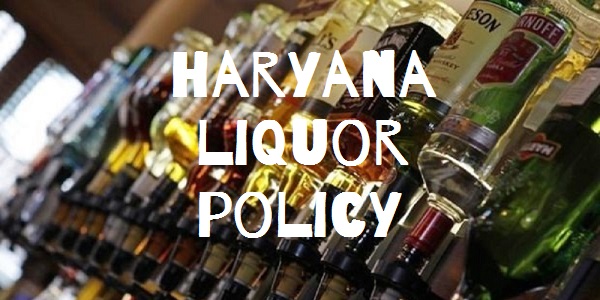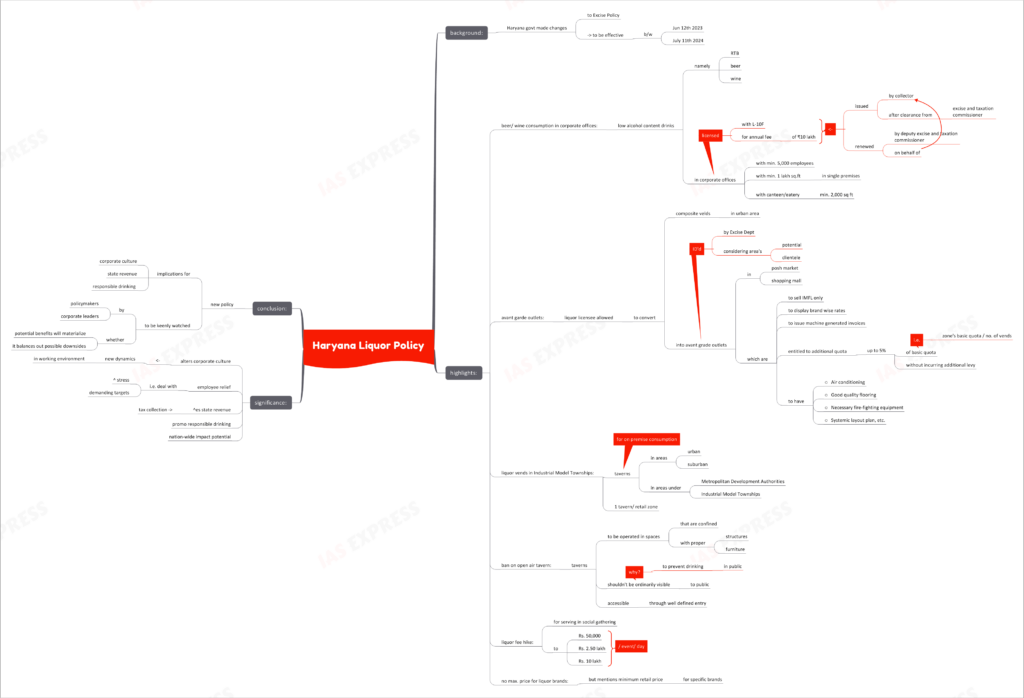Haryana Liquor Policy- Why is it Significant?

Recently, Haryana government announced its new liquor policy. Following approval by the Haryana Cabinet, the policy has sparked widespread discussions and varying reactions for its unique provisions- most notable of which is the provision allowing beer and wine consumption in corporate offices.

Background:
- The Haryana state government has made some changes in its Excise Policy with regards to alcohol.
- The new policy is to come into effect on June 12th. It will be valid till June 11th, 2024.
Highlights of New Policy:
- Permission for beer/wine consumption in corporate offices:
- Corporates will be allowed to possess and serve low alcohol content drinks (RTB, beer, wine) on their premises.
- The licensing criteria are:
- Minimum of 5,000 employees 2.Minimum 1 lakh square feet in a single premises
- 3. Canteen/ eatery with minimum 2,000 square feet
- For this purpose, the license L-10F would be provided. An annual fixed fee of ₹10 lakh would be collected.
- After clearance from the excise and taxation commissioner, L-10F would be granted by the collector.
- License renewal is by deputy excise and taxation commissioner, on behalf of the collector.
- Introduction of Avant-garde outlets:
- Liquor licensees are now allowed to convert their composite vends in posh markets/ shopping malls to Avant Garde Outlets.
- These outlets are to be identified, considering the area’s potential and clientele, by the Excise Department.
- These outlets can sell only Indian Made Foreign Liquor (IMFL).
- Brand-wise rates are to be displayed and machine-generated invoices should be issued.
- They will be entitled to lift an additional quota, up to 5% of basic quota, without incurring additional levy.
- The basic quota is derived by dividing the zone’s basic quota with the number of vends in the zone.
- These outlets are to have:
- Air conditioningGood quality flooringNecessary fire-fighting equipment
- Systemic layout plan, etc.
- Liquor vends in Industrial Model Townships:
- The policy allows the establishment of taverns in urban and suburban areas, as well as areas under Metropolitan Development Authorities and Industrial Model Townships.
- There shall be only one tavern per retail zone. These are authorized places for on premises liquor consumption.
- Ban on open-air taverns:
- Taverns must be operated in confined, enclosed spaces with proper structures and furniture.
- These spaces should not be ordinarily visible to passersby and it should be accessible through a well defined entry.
- License fee hike for serving liquor in social gatherings:
- Depending on the size of the gathering, the license fee has been increased to Rs. 50,000, Rs. 2.50 lakh, or Rs. 10 lakh per event per day.
- No maximum sale price for liquor brands:
- The policy does not set a maximum sale price for any brand of liquor for 2023-24 but does mention the Minimum Retail Price for specific brands.
Why is this significant?
- Altering Corporate Culture: The policy allows offices to sell alcohol within their premises. This introduces a new dynamic into the work environment, where traditionally, the consumption of alcohol is seen as inappropriate.
- Relief for Employees: For many employees, the workweek is marked by high stress and demanding targets. This policy is argued to introduces an avenue for relaxation within the workplace, potentially improving morale and camaraderie amongst colleagues.
- Contribution to State Revenue: One of the practical aspects of this policy is the potential increase in state revenue. Taxes from alcohol sales form a significant share of many states’ revenues, including Haryana. By permitting alcohol sales within corporate spaces, the government is expanding the avenues for tax collection.
- Promoting Responsible Drinking: This policy may have an unexpected benefit of promoting responsible drinking. As alcohol consumption will occur in a professional setting, it is likely to curb overindulgence and discourage aggressive or inappropriate behavior often associated with excessive drinking.
- Potential for Nationwide Impact: This policy could inspire similar changes in other states, leading to a nationwide alteration of workplace norms. The introduction of such a policy may lead to increased job satisfaction and employee retention in companies that adopt it, incentivizing other companies and states to follow suit.
Conclusion:
The new policy has corporate culture, state revenue and the promotion of responsible drinking. Whether these potential benefits materialize and how they are balanced against possible downsides will be watched keenly by policymakers and corporate leaders alike.
Practice Question for Mains:
Why is the new Haryana Liquor Policy of significance? Discuss. (250 words)
If you like this post, please share your feedback in the comments section below so that we will upload more posts like this.

